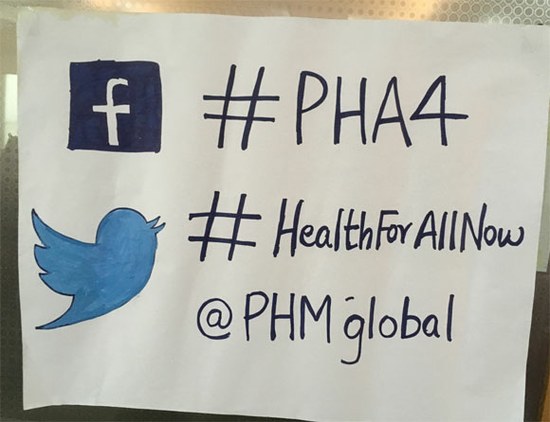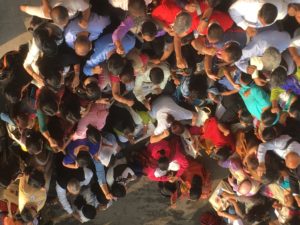 The Fourth People’s Health Assembly (PHA4) was hosted by the People’s Health Movement (PHM) and Gonoshasthaya Kendra (GK) at the BRAC BDM campus in Savar, Dhaka.
The Fourth People’s Health Assembly (PHA4) was hosted by the People’s Health Movement (PHM) and Gonoshasthaya Kendra (GK) at the BRAC BDM campus in Savar, Dhaka.
The People’s Health Assembly
As on earlier occasions, the Fourth People’s Health Assembly (PHA 4), drew on civil society organizations and networks, social movements, academia and other actors from around the globe. PHA4 provided again a unique space for strengthening solidarity, sharing experiences, mutual learning and joint strategizing for future actions.
The first PHA was held in Savar, Bangladesh in 2000 and was attended by more than 1500 people. The People’s Charter for Health — the PHM’s founding document — was developed and endorsed at this Assembly. The second Assembly was held in Cuenca, Ecuador in 2005 and attended by 1492 people. The Cuenca Declaration, issued at the conclusion of this Assembly, was designed to provide a strategic vision for PHM. The third Assembly was held in Cape Town, South Africa, in July 2012 and culminated with the adoption of the Cape Town Declaration.
The objectives of PHA4 and associated activities included:
- To evaluate and critically analyze current processes and policies that impact on health and healthcare at global, regional and local levels;
- To undertake a collective assessment of PHM’s organizational and programmatic activities and to provide a renewed mandate for the years to come;
- To enhance the capacity of health civil society activists to engage with and intervene in the policy making process, to monitor and drive policy implementation and to ensure accountability in the functioning of health systems;
- To foster and support constructive dialogue, planning and mobilization around health and the broader social determinants of health, involving the widest possible range of practitioners; and
- To launch renewed sustainable structures and dynamics, both within and outside the health sector, that will continue to drive coordinated action to secure universal and equitable access to health and health care.
Around 1400 participants from across the globe, including a substantial number of young activists, attended the Assembly, particularly from low and middle income countries. Participants include d representatives of civil society organizations/networks (including non-governmental organization, community-based organizations, trade unions, professional associations, etc.); governments, intergovernmental bodies, academic institutions, and others.
MMI Network members were active as speakers and moderators of formal PHA sessions, but also added valuable input through a series of self-organized workshops, all of them well attended, such as the one on “Concepts and Experiences of Community Health Care Workers. Reflections from Alma-Ata into the 21st Century” organized by medico international.
Learn more about PHA4 here
MMI workshop at PHA4
 In the public interest? The role of international health cooperation
In the public interest? The role of international health cooperation
in strengthening or weakening national health policies and systems
PHA Workshop on 17 November 2018, 17.00 – 19.00 hrs, Room 4
Six years ago, the MMI Network contributed to the Third People’s Health Assembly in Cape Town with its workshop „In the public interest? The role of NGOs in national health systems and global health policy”. The two sessions on “The challenge of integration” and “NGOs – the good, the bad and the evil?” found great interest – and showed us that there is a need to continue the conversation in the role of international actors in national health policies and systems beyond the initial focus on international NGOs.
Since then, MMI Network has been shaping and sharpening its role as a promoter, convener and facilitator of a critical reflection on the role of international cooperation (aid, development cooperation) in strengthening or weakening people centred and people owned national health policies and systems, by setting up a working group, by publishing a discussion paper on Health Cooperation: Its relevance, legitimacy and effectiveness as a contribution to achieving universal access to health (October 2016) and by hosting a series of conferences and workshops dedicated to the topic.
The debate on aid or development cooperation took also place in various forms at the Fourth People’s Health Assembly, oscillating between the call to stop aid (as it part of the problem, not the solution, and cannot be “repaired”) and a critical perspective on what is needed to move cooperation and solidarity beyond aid (as the involvement of external actors in national health policies, systems and service delivery will remain a challenging reality in many countries).
Bringing the topic again into the People’s Health Assembly, the MMI Network hoped to be able to provide again a space for an open debate between NGOs and other social movements, between representatives of the global South and North, about what kind of solidarity, what kind of action and interaction is needed to advance Health for All.
We expected to take along the following:
- to get a better understanding about how the role of “aid” in strengthening or weakening people centred and people owned national health policies and systems is assessed and debated by civil society representatives from various backgrounds;
- to renew and strengthen contacts among civil society experts and institutions interested to engage together in further defining a political position about what should be the role of international cooperation for global solidarity in health;
- to strategize on how to strengthen the representation of a critical global civil society in global fora dealing with aid / development cooperation in the health sector (in particular: UHC2030 and its working groups).
In the workshop, input (stories, analysis, perspectives) was provided in a lively democratic conversation by all participants and complemented by the representatives of the MMI Network who referred to their discussion paper published in 2016.
Concluding the workshop, participants agreed that solidarity is about equality, about a common fight for human rights and about building a social movement. They also agreed that the discussion about a solidarity and rights based approach in health cooperation needs to be continued and deepened.
Workshop participants also concluded that efforts need to be undertaken to strengthen a critical civil society voice (beyond the typical “northern development NGOs”) in global fora on aid / development cooperation and health.
Finally, participants agreed to continue the conversation among themselves, via a mailing list set up and launched by the MMI Secretariat, beyond the workshop and for a limited time.
Workshop: draft report (“work in progress”) Download PDF
Workshop: concept note Download PDF
Workshop: flyer A4 Download PDF
Workshop: moderation slides Download PDF
Workshop: photos Flickr album by Martin Leschhorn (scroll down)
MMI discussion paper 2016: Website
Astana workshop, October 2018: Website
MMI lead: Remco van de Pas and Thomas Schwarz
Enquiries: office@medicusmundi.org
